deborah elizabeth whaley
"A writer falls in love with an idea and then get's carried away" -- Doris Lessing
Black Women in Sequence:
Re-inking Comics, Graphic Novels, and Anime
Educators: Click Here for the Teaching Companion Site (Coming soon in 2021)!


Black Women in Sequence: Reinking Comics, Graphic Novels, and Anime takes readers on a search for women of African descent in comics subculture. From the 1971 appearance of the Skywald Publications character “the Butterfly”—the first Black female superheroine in a comic book—to contemporary comic books, graphic novels, film, manga, and video gaming, a growing number of Black women are becoming producers, viewers, and subjects of sequential art. As the first detailed investigation of Black women’s participation in comic art, Black Women in Sequence examines the representation, production, and transnational circulation of women of African descent in the sequential art world. In this groundbreaking study, which includes interviews with artists and writers, Deborah Elizabeth Whaley suggests that the treatment of the Black female subject in sequential art says much about the place of people of African descent in national ideology in the United States and abroad.
Order a copy@ UW Press or on Amazon!
Characters featured:
The Butterfly
Martha Washington
Misty Knight
Black Mariah
Capitan Marvel/Photon/Monica Rambeau
Ceila Reyes
Friday Foster
Torchy Brown,Patty-Jo n Ginger, Candy
Catwoman I, II, III, IV
Nubia
Sand Storm
Storm
Vixen
Nadia
Comix creators featured:
Leisl Adams
Michelle Billingsly
Barbara Brandon-Croft
Jennifer Crute
Rashida Jones
Rashida Lewis
Jackie Ormes
Afua Richardson
Juliana Smith
Viga Victoria
Nara Walker
Ashley Woods

-
$30.00S PAPERBACK (9780295994963)
-
$80.00X HARDCOVER (9780295994956)
-
SUBJECT LISTING: American Studies, Women's, Gender, and Sexuality Studies; African American Studies; Visual Studies
-
BIBLIOGRAPHIC INFORMATION: 288 pp., 22 b and w illus., 22 color plates, 10 x 7 in.
Table of Contents:
(read an excerpt here!)
Preface Acknowledgments
Dedication
Introduction
1. Re-inking the Nation: Jackie Ormes’s Black Cultural Front Comics 2. Black Cat Got Your Tongue? Catwoman, Blackness, and Post Racialism
3. African Goddesses, Mixed-Race Wonders, and Baadasssss Women
4. Anime Dreams for African Girls: Nadia: The Secret of Blue Water 5. Where I’m Coming From: Black Female Artists and Postmodern Comix
Conclusion: Comic Book Divas and the Making of Sequential Subjects
Index
REVIEWS :
"For every little Black girl and Black woman, who imagine themselves coloring both inside and outside the lines, Black Women in Sequence literally fills in the blank spaces, highlighting the contributions of Black Women in the genres of comics, graphic novels, and anime."―Mark Anthony Neal, author of Looking for Leroy: Illegible Black Masculinities
"In this accomplished and beautifully designed work, Whaley reminds us that imaginary realms are full-fledged social worlds. Graphic novels, comics, and anime are halls of mirrors―kaleidoscopes spinning truth, speculation, and distortion all at once. But they are also portals of possibility; and, Whaley's perceptive exploration of these genres reveals how black women create and perform their worlds when they can dream without limits."―Alondra Nelson, Columbia University
"Black Women in Sequence considers how Black women function as 'referents' for a larger discussion about social relations. What sets the book apart is its sophisticated approach to the subject."―Cassandra Jackson, author of Violence, Visual Culture, and the Black Male Body
"This book has a great deal to contribute to the field. There's never been a publication that focuses on the diversity of representations by Black female comics creators to this magnitude."―John Jennings, coeditor of The Blacker the Ink: Constructions of Black Identity in Comics and Sequential Art
"Unlike many scholarly works in comics Whaley chooses to extend her analysis beyond print, looking at representations on the screen including video games, television, and film. Whaley also supplements this representational analysis with interviews with artists and writers. This diversity of inquiry creates an engaging, multifaceted portrait of black women’s representation in sequential art and what those portrayals say about US culture" ―Francisca Lynn, Feminist Media Studies.
"A must read."--Laura Sneddon, Women Write about Comics
"Whaley presents a compelling study of women of African descent in American comics. . . . The kaleidoscopic nature of her study allows readers to form a comprehensive idea about the politics of race and gender in American comics from the late 1930s until today. . . . With its far‐ranging thematic scope and range, Black Women in Sequence is destined to become a cornerstone in the study of gender and race in American comics."
--Kirsten Møllegaard, Journal of Popular Culture
"Black Women in Sequence does important work in analysing gender and racial representation within graphic narratives, demonstrating the breadth of material available to unpack. It opens the dialogue, makes space for black women artists, and demands the discussion maintains an awareness of intersectionality, while reminding us that the politics of gender, race and sexuality cannot be easily disentangled even in the comic world of quick-fix problems." --Sarah Holland, Poet, MFA,
Science Fiction Film and Television
"One of the first book-length works to deal specifically with the construction and experience of black women in sequential art. . . . Whaley considers the creation and consumption of sequential media by black women, often erased from conversations about fan culture. . . . An extraordinarily ambitious work."--Joshua Abraham Kopin, American Literature
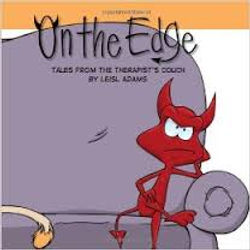 on the edgeby leisl adams | 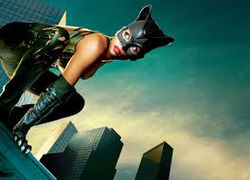 catwoman: the moviefrom the DC film of the same name |
|---|---|
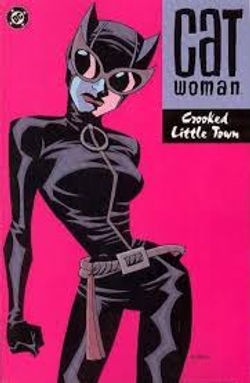 catwomanby ed brubaker (dc comics) | 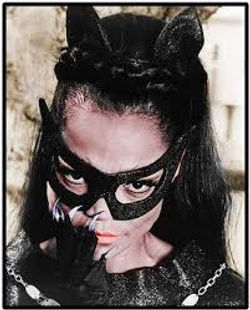 eartha kitteartha kitt as catwoman (from the television series batman) |
 on the edgeby leisl adams |  monsters under the bedby leisl adams |
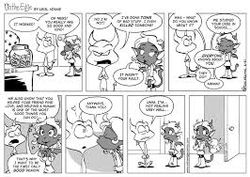 on the edgeby leisl adams | 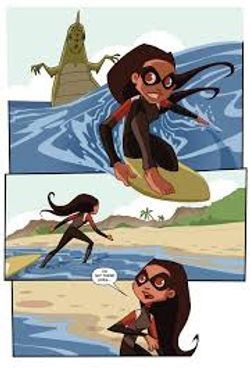 eartha kitt femme fataleby marc shapiro |
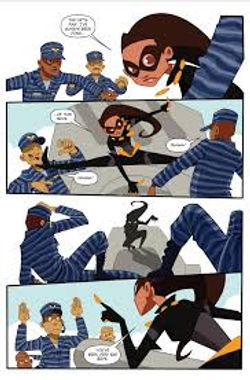 eartha kitt femme fataleby marc shapiro | 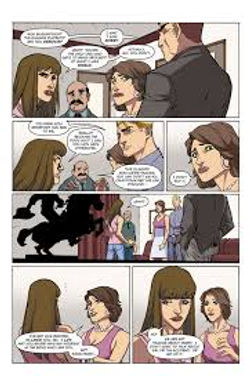 frenemy of the stateby rashida jones |
 frenemy of the stateby rashida jones |  rashida jonesauthor of frenemy of the state |
 frenemy of the stateby rashida jones |  Stormx-men (marvel) |
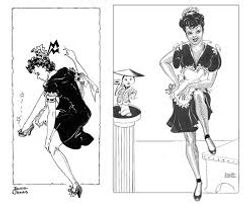 candy comic stripby jackie ormes |  patty-jo n' ginger comic stripby jackie ormes |
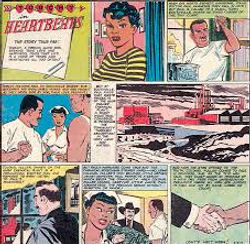 torchy: heartbeats comic stripby jackie ormes | 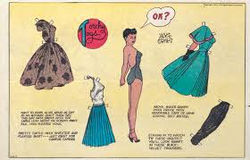 torch brown togsby jackie ormes |
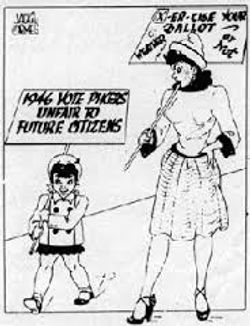 patty-jo n' gingerjackie ormes | 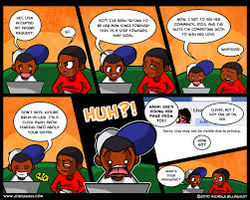 joeby michelle billingsley |
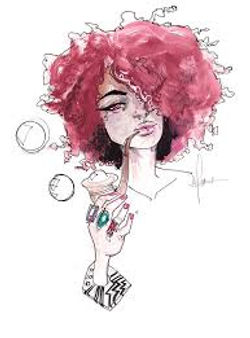 afua richardson sketch | 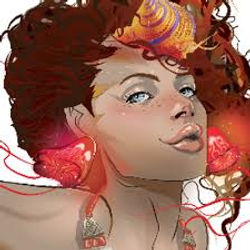 afua richardson sketch |
 (pilot) geniusafua richardson | 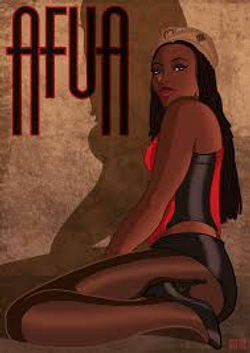 afua richardson |
 songbirdsby nara walker | 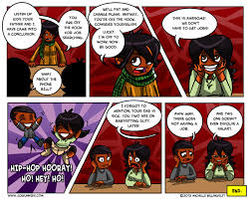 joeby michelle billingsley |
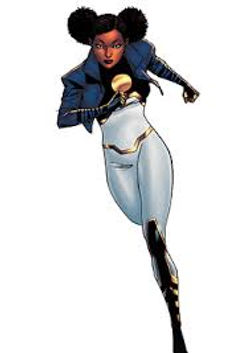 misty knightmarvel |  stormx-men (marvel) |
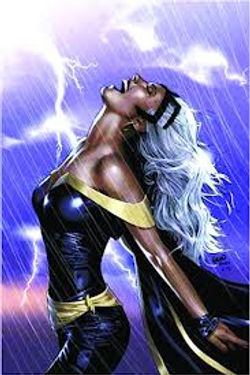 stormx-men (marvel) |  stormx-men (marvel) |
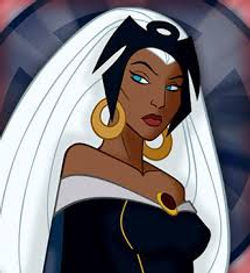 stormx-men animation series |  legacy of light/light of dayby nara walker |
 legacy of light/light of dayby nara walker | 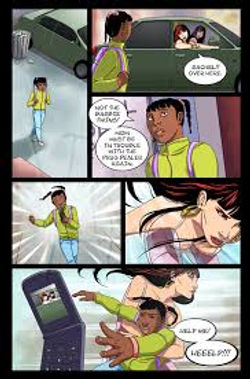 millennia warby ashley woods |
 millennia warby ashley woods | 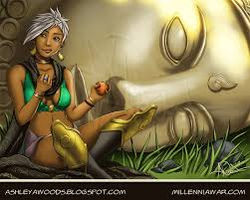 millennia warby ashley woods |
 millennia warby ashley woods |  jackie ormes sketchdu sable museum collection |
 the butterflyskywald |  martha washingtondark horse comics |
 martha washingtondark horse comics |  nubiawonder woman (dc comics) |
 nubiawonder woman (dc comics) |  friday fosterchicago tribune |
 catwoman and other cat talesdc |  nubiafinal crisis (dc comics) |
 nubiawonder woman (dc comics) |  vixenby willow wilson (dc comics) |
 vixen is a lady fox(dc comics) |




